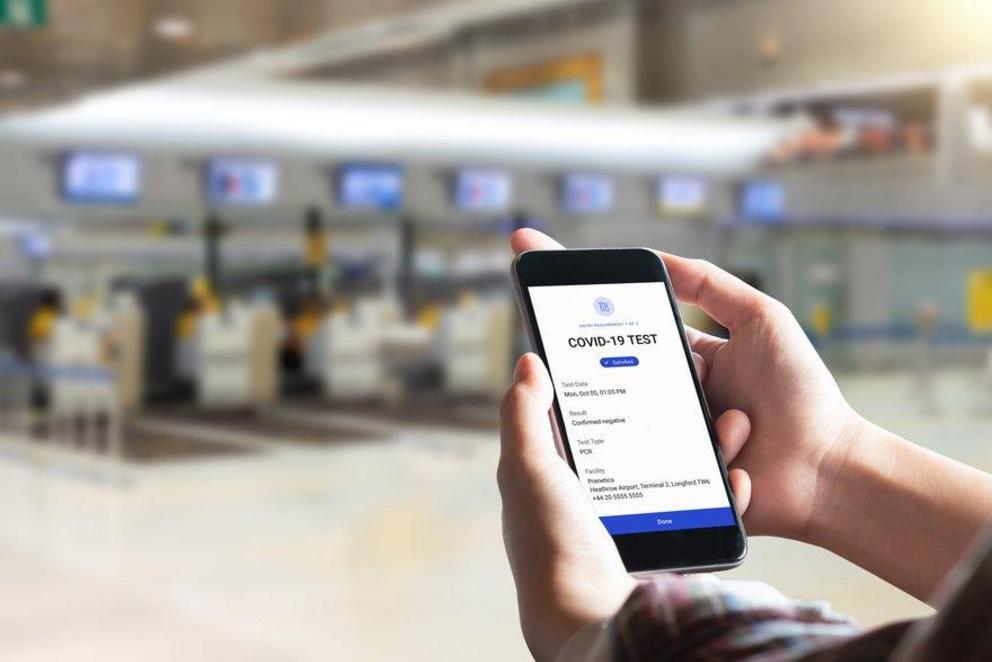There's a scramble to create digital 'health passports.' These companies are teaming up to make sure they all work
There are various efforts are currently underway to develop digital health credentials systems—both vaccination and test certificates. The CommonPass mobile app is being used by United Airlines and other airlines on some international flights.
COVID-19 test results are already required for entry at some airports and at international borders, and it's likely that confirmation of getting a COVID-19 vaccine will soon follow.
But most patients who have been vaccinated against the virus only get a small piece of paper as proof.
Those papers are easy to lose and highly vulnerable to fraud and counterfeiting, industry stakeholders say. So public and private organizations have turned to the idea of developing digital health passports to help restart global travel.
Virtual Roundtable
Disruption, Acceleration & Innovation: Pharmacists on the Frontline
This year, pharmacists will play a critical role in the United States’ COVID-19 immunization efforts. Although this is welcomed news, this new duty and other coronavirus responsibilities are exacerbating pharmacist burnout. In this panel, experts will explore how pharmacists can leverage technology to automate administrative tasks and satisfy patient needs.
But, there's a catch there too, experts say. Without agreed-upon standards, different digital health passes risk creating a fragmented system that will only slow down efforts to bring travel back safely.
"You might show up at the airport trying to prove your recent COVID test result or vaccination certificate, and you pull up an app that is not recognized, and now you're scrambling to figure out how to get on the plane," said Dakota Gruener, executive director of ID2020, an organization which advocates for digital IDs.
Gruener was speaking to reporters during a briefing with reporters Monday to announce a new cross-industry collaboration aimed at addressing the problem. Companies in the technology, health and travel sectors have banded together to form the Good Health Pass Collaborative to create a "blueprint for interoperable digital health pass systems."
“Fragmentation is a risk we simply cannot ignore. To be valuable to users, credentials need to be accepted at check-in, upon arrival by border control agencies, and more," Gruener said. "We can get there—even with multiple systems—as long as solutions adhere to open standards and participate in a common governance framework.'
But without these, Gruener said, "fragmentation is inevitable, and travelers—and the economy—will continue to suffer needlessly as a result."
The organizations involved include health technology company Lumedic, IBM, Airport Council International, Commons Project Foundation, COVID-19 Credentials Initiative, Evernym, Hyperledger, International Chamber of Commerce, Mastercard and the ID2020 Alliance, a global partnership that focuses on digital identities.
The COVID-19 pandemic has impacted every segment of the global economy, but none as profoundly as travel and tourism. Last year, airlines lost an estimated $118.5 billion with related impacts across the economy in excess of $2 trillion.
There are various efforts are currently underway to develop digital health credentials systems—both vaccination and test certificates. The CommonPass mobile app, created by the Commons Project Foundation and the World Economic Forum is being used by United Airlines and other airlines on some international flights. The World Health Organization is also working on a digital vaccine certificate.for international travel, and Health Pass by Clear is in use at Los Angeles International Airport.
But, it's unlikely that a single solution will be implemented universally, Good Health Pass Collaborative executives said.
The initiative is not intended to supplant existing efforts, but rather to help weave them together, fill gaps where they may exist, and facilitate collaboration among a new ecosystem of stakeholders, many of whom have never worked together before, said Chris Reid, executive vice president, identity solutions at Mastercard, during the briefing.
Prioritizing privacy, user experience
The Good Health Pass Collaborative has set out four primary requirements that digital health credential systems must satisfy. First, digital health passes need to be secure and embed privacy by design, according to the organization. Solutions also should seamlessly integrate into testing and travel processes to streamline the experience for individuals and airlines alike.
The solutions also should work across borders and across industries, the organizations said. A digital health pass must work at airports, airlines, ports-of-call and borders worldwide and comply with international and local regulations.
Restoring confidence—among travelers and governments—is a critical step to restoring mobility and resuming other public activities, the organization said.
“Our health data consists of the most sensitive personal information, deserving of the strongest privacy. Release of our health data must be under our personal control. The Good Health Pass does just that. With Privacy by Design embedded throughout, you control the release of your digital health data, and to whom; all de-identified and decentralized, privacy and functionality," said Ann Cavoukian, Ph.D., executive director of the global Privacy and Security By Design Centre, in a statement.
Reid said the collaboration's efforts would accelerate "a larger pattern in individual privacy and data ownership that impacts more than travel."
In contrast to paper vaccination records, digital health credentials can be printed, such as a QR code, or stored on an individual’s mobile phone. Using common standards, digital health passes can enhance user privacy and “bind” an individual’s identity to a test result or vaccination certificate to enable real-time, fraud-resistant digital verification.
About 20 organizations are involved in the collaboration and the Good Health Pass Collaborative has put out a call to policymakers and representatives of government agencies; companies in the health, technology and travel sectors; and civil society organizations to join the effort.
"There is an important role for policymakers to play to put guardrails around these solutions," Gruener said. "We’re trying to do so in a market-based way. We're asking our policymakers to provide guidance and regulation around how this data can be used."

